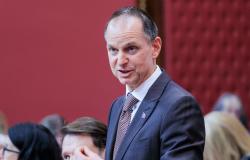The Capital Transportation Network (RTC) will receive $37.8 million in government assistance to help it complete its budget by 2028. For the single year 2025, the envelope will be $12.1 million.
These sums, negotiated for a long time, were already known and budgeted for in the next financial years of the RTC. They were confirmed Thursday, in the economic update of the government of Quebec, within the total budget reserved for the province’s transport companies.
Some 879.6 million will be disbursed between 2025 and 2028 for public transport companies.
This made the mayor of Quebec jump, “disappointed” with the proportion reserved for the national capital.
“That represents 4%. It’s disappointing. If it’s just that for Quebec, it seems to me that it’s not the proportion of what we represent,” lamented Bruno Marchand, after leaving a meeting with other mayors of the Metropolitan Community of Quebec.
“We are not getting fairness in relation to our population. The region deserves and needs [de plus].»
— Bruno Marchand, mayor of Quebec
The Quebec region can still “do better” in terms of public transportation, he argues. “But for that, we need resources,” he insists, taking care not to refer to the tramway.
For a change of the “distribution key”
The “distribution key” used to separate funds between the different transport companies remains an “issue” for Mayor Marchand. The amounts are distributed according to the use of the different services, in the different regions.
Cities that offer more services to a larger population that uses public transportation more, like Montreal, find themselves “favored.”
“The distribution key will have to be changed,” defends the mayor of Quebec.
The 2025 RTC budget is complete. But by 2028, it will have a shortfall of almost $47 million. Bruno Marchand is already asking for a review of the routes at the RTC.
But for the rest, “there will be no magic,” he warns. Even service cuts, “everything will be on the table”.
One thing is certain, however.
“There is no question that the new services that will emerge [de 2025 à 2028] be called into question. We did not charge a tax on registration to ensure that people pay to make up for a deficit in total. It’s non-negotiable,” he reiterated.
Earlier this week, he pledged that the majority – more than half – of the sums raised by the registration tax would be reinvested in the provision of services to users.
Not a “reward for the bad student”
For his part, the leader of the official opposition welcomed on Thursday the amounts allocated to the RTC in the economic update from the Minister of Finance, Éric Girard. With just one downside.
“Our concern is that this is not received by the RTC as a reward for the bad student,” illustrated Claude Villeneuve, in reference to the independent audits commissioned by the government, in which Quebec ranks at the bottom of the pack for its economic performance.
“We receive money from the Quebec government, but the corollary is that we do the work so that our affairs are as tight as possible, as best managed as possible. I invite the RTC to do its homework to show that it deserved this money.”
In what she describes as a “crisis” in public transportation, the head of Transition Quebec, Jackie Smith, expressed regret that the Legault government only has “crumbs” in store for her.






